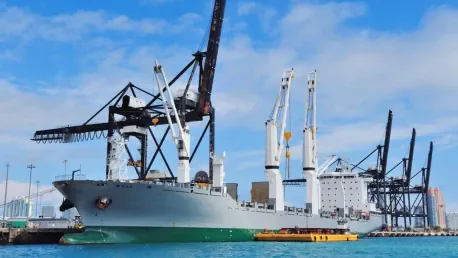The ongoing U.S. port strike at the East and Gulf Coast ports has significantly disrupted the trucking and shipping logistics vital to the chemical industry, a sector that serves as one of the backbones of the American economy. These ports collectively manage approximately 90% of all waterborne chemical shipments in the United States, making them pivotal conduits in the supply chain of critical materials. The ripple effects of this strike are now threatening the stability and flow of essential supplies necessary for various industries ranging from healthcare to technology, amplifying concerns over potential nationwide economic repercussions.
Economic Pillar and Its Broad Reach
The chemical industry is a substantial economic contributor in the United States, generating more than $639 billion annually and supporting over 25% of the nation’s GDP. This sector’s wide-ranging products, from pharmaceuticals to plastics, play vital roles across numerous fields, underscoring their indispensable nature. The disruption caused by the port strike affects not only the domestic market but also has far-reaching implications on international trade, given that the chemical industry accounts for 10% of U.S. goods exports.
In 2023 alone, the industry generated $164 billion in export revenue, highlighting its importance in fueling economic growth. The reliance on these ports for transportation means that any operational halt severely impacts the flow of goods, affecting numerous downstream industries reliant on timely chemical supplies. This interconnectedness places a massive strain on the supply chain whenever marine shipments come to a standstill, creating significant risks for broader economic stability.
The Vital Role of Marine Transportation
Key ports along the East and Gulf Coast, including Houston, New Orleans, and the Port of South Louisiana, are monumental in handling overwhelming volumes of chemicals. Roughly 90% of waterborne chemical shipments in the U.S. pass through these strategic hubs. The strike has halted operations at these vital points, leading to significant delays and disruptions that reverberate through the entire supply chain.
The chemical industry’s dependence on these ports for the timely delivery of raw materials and finished products cannot be overstated. This timing is critical for sectors ranging from healthcare and agriculture to technology and construction. Any delay in the logistics chain results in a cumulative effect, stalling production lines and service operations across various industries, thereby crippling parts of the economy that depend on these timely chemical deliveries.
Broader Economic Consequences
The port strike represents not just a logistical challenge but also a looming economic crisis. The immediate halt in chemical shipments creates an acute shortage of vital products, raising alarms about larger economic consequences. As inventories diminish, industries dependent on these chemicals experience stalled production, which can lead to significant job losses and a broader economic slowdown.
Moreover, the disruption has implications for international trade relationships. Countries that rely on U.S. chemical exports may seek alternatives, risking long-term trade partnerships and altering global market dynamics. Domestically, the strain on supply chains can drive up costs and result in price inflation, complicating an already fragile economic landscape. These disruptions highlight the interconnectedness of the global economy and the critical role of stable marine logistics in maintaining economic equilibrium.
The Call for Governmental Intervention
Given the critical role of these ports in the national economy, the American Chemistry Council (ACC) has called for immediate governmental intervention. Chris Jahn, the President and CEO of the ACC, has explicitly urged the White House to engage in resolving the labor dispute promptly. He warns that without swift action, the prolonged strike could lead to severe and lasting economic damage, disrupting supply chains and halting economic growth.
This call for intervention emphasizes the necessity for federal action to safeguard the nation’s supply chain. By stepping in, the government can help broker a resolution that ensures the continuity of port operations and stabilizes the economy. This proactive approach is essential to prevent the deepening of the current logistic and economic crisis, which increasingly threatens the broader economic landscape.
Interconnectedness and Vulnerabilities
The strike at these strategic ports has exposed the vulnerabilities within the chemical industry’s extensive supply chain. The industry’s heavy dependence on a limited number of ports for transporting substantial volumes of goods underscores the pressing need for diversified logistics strategies. As industries make efforts to grow back from the pandemic’s impacts, ensuring resilient and flexible supply chains becomes even more critical to mitigate similar disruptions in the future.
The current disruption serves as a stark wake-up call for the industry to evaluate and reconsider its logistics and supply management strategies. Strengthening alternative transportation routes and creating buffer inventories could help mitigate the impacts of such strikes in the future, providing a more secure operational environment. This strategic fortification could protect against unexpected disruptions and ensure the continuous flow of essential materials.
Urging Swift Resolution
The ongoing port strike at the East and Gulf Coast ports in the United States has severely disrupted the crucial trucking and shipping logistics within the chemical industry, which is a fundamental pillar of the American economy. These ports handle around 90% of all waterborne chemical shipments in the nation, making them essential to the supply chain of critical materials. As a result of this strike, there’s a significant threat to the stability and smooth flow of necessary supplies across various industries, from healthcare to technology. The impact is so profound that it raises serious concerns about potential nationwide economic repercussions. The disruption caused by the strike not only hampers the timely delivery of essential chemical products but also affects the production schedules of countless manufacturers who rely on these materials. Consequently, there is an overarching fear that prolonged disruptions could lead to shortages and increased costs, further straining an already challenged supply chain and exacerbating inflationary pressures in the broader economy.









